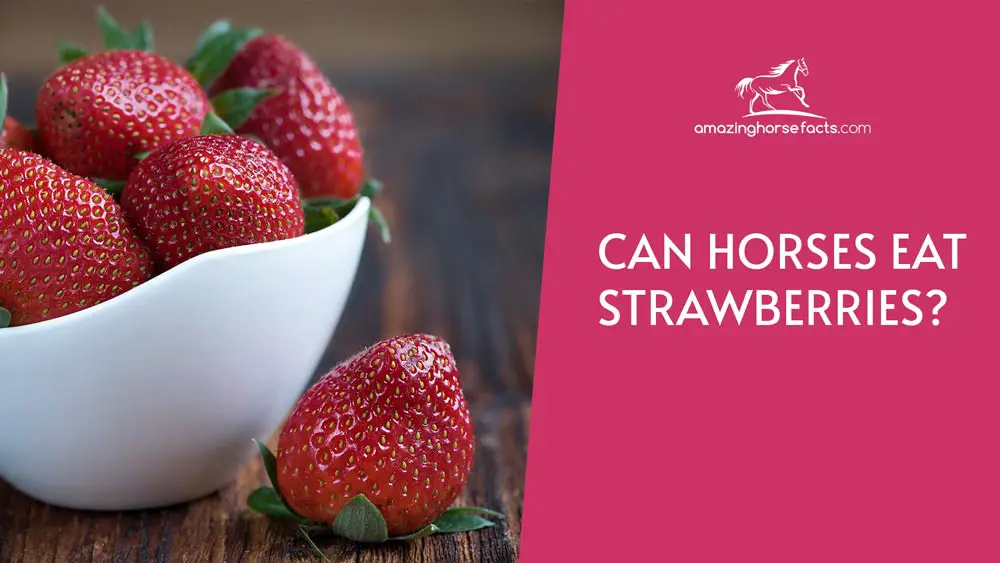Skip To Section

YES! Strawberries and most (if not all) fruits and vegetables are healthy and safe for horses. Strawberries have minerals and vitamins that are vital for your horse’s health.
However, given their high sugar content, strawberries are ideal as an occasional snack in moderate quantities.
Strawberries have a sweet taste, so horses can easily over-eat them, yet excessive consumption has been found to cause some digestive problems.
Moderation is key, and the right amount of strawberries to give your horse will be determined by several factors, the most notable being size, weight, and activity levels.
What’s more, it matters how you feed strawberries to your horse. All in all, the nutrients in strawberries make it important to include them in your horse’s diet.
What Are Strawberries?
Strawberries are thought to be berries. However, they are a special type of fruits known as aggregate accessory fruits i.e., fruits that hold the ovary instead of being fruits of the ovary.
Benefits Of Strawberries
Strawberries are rich in Vitamins (C, E & B9) and minerals like potassium and magnesium. These vitamins and minerals have notable health benefits to horses.
1. Vitamin C Benefits In Horses
Horses get a variety of benefits from Vitamin C, the most notable being antioxidant benefits. Horses which get enough quantities of Vitamin C are able to get rid of harmful free radicals.
Vitamin C also helps in regenerating Vitamin E, synthesizing hormones, collagen synthesis, and bone calcification. Vitamin C also maintains a healthy coat and overall immune system health benefits such as faster healing.
2. Vitamin E Benefits In Horses
Horses need Vitamin E for maintaining normal neuromuscular function. Deficiency is linked to neuromuscular disorders that affect voluntary muscle and nerve control, hindering many functions, including movement.
3. Vitamin B9 Benefits In Horses
Vitamin B9 supports many health functions in horses. For instance, the vitamin supports cell and tissue growth and repair. The vitamin is also important for boosting hemoglobin levels in the blood, critical for good cardiovascular health.
The vitamin is also common in antiprotozoal drugs used to treat ailments affecting horses like Protozoal Myeloencephalitis, known to cause face, mouth, and eye paralysis, seizures, and difficulty swallowing.
4. Benefits Of Potassium And Magnesium In Horses
Magnesium is linked to good nerve and muscle function in horses. While calcium is needed for contraction, magnesium is needed for muscles to relax. Magnesium deficiency in horses is linked to many problems such as excessive physical exertion, stress, muscle tremors, deep breathing, and potential collapse.
Potassium is proven to balances osmotic pressure in the cells, and most of it is stored in the muscles playing a critical role in controlling muscle contractions.
5. Digestive System Benefits Of Strawberries
Strawberries are also rich in fiber and water that offers digestive benefits, among other health benefits.
Do Strawberries Pose Any Risk To Horses?
While strawberries offer all the above benefits to horses and more, they come with some risks. For instance, horses can choke on strawberries if they end up down the wrong gullet. It may therefore be advisable to slice them, especially when feeding smaller horses.
Also, excessive consumption can cause digestive system problems such as bloating, vomiting, and gastrointestinal discomfort. What’s more, strawberries should only be viewed as a snack and not a substitute for main food as this can cause nutritional deficiency.
Strawberries are also packed with sugar, so excessive consumption can result in sugar-related problems in horses like digestive tract overload or insulin resistance.
Also, wash the strawberries well before you feed your horses. Insecticides and pesticides can make a horse sick. The freshness of the strawberries also matters. Strawberries that are stale, rotten, or have mold/fungi in them can also cause health problems.

FAQs
How Should You Give Strawberries To Horses?
As mentioned above, the strawberries should be washed properly to remove chemical residue like pesticides, if present. The strawberries also need to be fresh.
How Many Strawberries Can I Give My Horse?
Horses should be fed strawberries in moderation. A handful of strawberries are safe (six to ten strawberries are enough every week), according to many experts.
How Many Strawberries Should A Horse Eat?
If you are feeding your horse strawberries for their nutritional benefits, a few a day is enough. While large horses may not be affected by a handful of strawberries a day, there are risks discussed above associated with horses consuming strawberries excessively.
Strawberries are packed with sugar which isn’t good for horses in large quantities. What’s more, excessive consumption can introduce colic risks. The general recommendation is a handful of strawberries a week.
Are Strawberries Good For Horses?
Yes! But in small quantities.
Like anything else, excess consumption (a large amount) of strawberries is bad. The risk factors range from excessive sugar to colic and other digestive health problems.
Most importantly, strawberries should never substitute a horse’s normal nutrition. They are best for horses when treated as occasional treats.
Are Strawberries Bad For Horses?
No! Strawberries aren’t that different from other fruits. Generally, animals, including horses, should eat foods packed with nutrients (like strawberries). However, they can get all nutrients from their food, making the presence or absence of strawberries in their diet irrelevant.
Do Horses Like Strawberries?
Yes! Horses enjoy sugary foods. However, sugar isn’t good for horses.
Conclusion
Can horses eat strawberries? Yes. Horses love sugary things like strawberries. However, they shouldn’t be given a lot of strawberries due to the risks mentioned above. Strawberries are most beneficial to horses as a snack eaten sparingly. In large quantities, they can cause acidity problems like colic.
Strawberries should also be introduced slowly to a horse’s diet (as a sweet treat) to monitor any initial side effects. If your horse develops any problems after eating strawberries, see a vet immediately.
All-in-all, your horse can do fine without strawberries if they are taking a balanced diet crafted by an expert. However, horses can eat one or two strawberries if you find yourself munching on them and your horse wants a bite.
